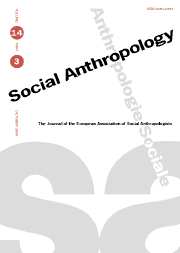Article contents
Processes of identification and the incipient national level. A Tokelau case
Published online by Cambridge University Press: 01 October 1999
Abstract
Focusing on local cognitive orientation and practice, described as producing ‘a sense of place’, the article discusses how macro-political processes associated with the UN's decolonisation programme affect the atoll society of Tokelau in the South Pacific. Local orientation is expressed as a general tendency to represent relationships in spatial terms. Political practice takes the form of fighting for ascendancy. It is shown to be attached to a qualitatively different way of life than that connected to institutions established as infrastructural prerequisites for achieving nationhood. The balancing act Tokelauans, along with their political counterparts, achieve represents a genuine case, one which may in turn serve as a model for experimenting nationhood elsewhere.
- Type
- Research Article
- Information
- Copyright
- © 1999 Cambridge University Press
- 5
- Cited by




